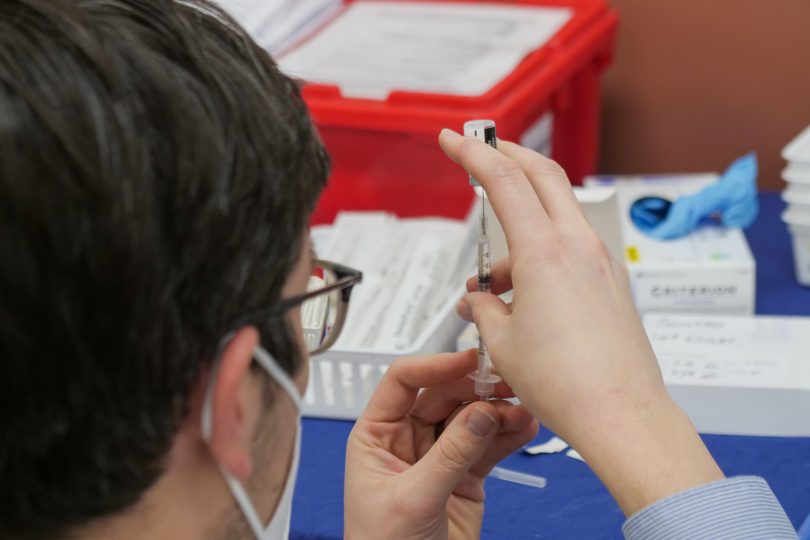
Doctors and nurses on the NSW South Coast will receive the Pfizer vaccine in Bega. Photo: Steven Cornfield.
Health workers on the NSW South Coast will no longer have to embark on a potential 12-hour round trip to Sydney to receive the Pfizer COVID-19 vaccine following NSW Health’s decision to send vaccinators to Bega.
Last week, Region Media obtained an email that showed doctors and nurses working as far south as Eden and Bega were being told to take time off work to attend a clinic in Liverpool, Sydney, to receive the jab.
The email was sent to more than 200 staff who were identified as high priority for the early phase 1a vaccination, which began on Monday, 22 February.
However, following conversations between Member for Eden-Monaro Kristy McBain and Federal Minister for Health Greg Hunt it was agreed that Liverpool Hospital vaccinators would travel to South East Regional Hospital in Bega.
The Pfizer vaccine is due to arrive in the first week of March and will be administered during the first and second week of that month, according to Dr Duncan Mackinnon from South East Regional Hospital.
READ ALSO: Suspected outbreak of Ross River Fever and Barmah Forest Virus in southern NSW
“This is a common-sense solution for frontline workers who have carried the weight of bushfires and the pandemic for more than 12 months now,” said Ms McBain.
“Thank you to local health leaders who raised this issue with me. You know your community and what’s needed.”
Dr Mackinnon said it is ‘fantastic’ that NSW Health and politicians listened to feedback from health workers, and that it makes sense to distribute the vaccine locally.
However, healthcare workers at Crookwell and Braidwood’s small, rural hospitals will still need to travel up to two-and-a-half hours to Liverpool, while healthcare workers in the larger staffed Queanbeyan and Yass hospitals will only need to travel a short distance to a clinic in the Canberra suburb of Garran for the vaccine.
A NSW Health spokesperson said this would only be the case during the first few weeks of the phase 1a rollout of the Pfizer vaccine.
“As further vaccine supplies are delivered to NSW, and further hubs are opened, outreach programs will also be offered to identified phase 1a staff in other parts of the state,” said the spokesperson.
There have been arguments that the distribution of the Pfizer vaccine is challenging because it must be stored at ultra-low temperatures.
However, Ms McBain said there’s no reason why it couldn’t be distributed to hospitals across the state.
“It came to Australia on an aeroplane packed in dry ice in Styrofoam containers,” she said. “If we can manage that from other countries, surely we can manage that within our own country.
“Local doctors who are obviously well aware of dealing with multiple vaccines do not express concerns about the vaccine having to travel or be stored in other locations. It’s fairly standard practice for a number of other vaccines.”
However, Minister Hunt said it was always the plan to operate a hub-and-spoke model in NSW, which means the vaccine would be delivered to healthcare workers via local hospitals including throughout Eden-Monaro, but that it was up to the states and territories to set the locations of the Pfizer hubs.
“States and territories will also have the ability to redistribute vaccines to other vaccination sites to ensure phase 1a population groups will be vaccinated,” he said.
“The number of vaccination clinics for both the Pfizer vaccine and the AstraZeneca vaccine will increase as more doses arrive in Australia for priority groups in phase 1a.”
Unlike the Pfizer vaccine, the AstraZeneca vaccine doesn’t require storage in super cold temperatures, which means it can be distributed to, and administrated by, more vaccination hubs.
As Australia moves into phase 1b of the vaccine rollout, doses of the AstraZeneca vaccine will be available at general practitioner respiratory clinics, general practices, Aboriginal community health services and state-run vaccination clinics, according to Minister Hunt.
“In addition, the Australian Government is ensuring those who are particularly vulnerable to the worst effects of the coronavirus receive the earliest protection, with aged care residents across Australia to begin receiving their first vaccine dose against COVID-19 [this] week,” he said.







